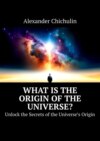Buch lesen: «What is the origin of the universe? Unlock the Secrets of the Universe’s Origin»
© Alexander Chichulin, 2023
ISBN 978-5-0059-9850-7
Created with Ridero smart publishing system
1. Introduction
The universe is vast and mysterious, and one of the biggest questions that scientists and philosophers have been asking for centuries is: what is the origin of the universe? This question has intrigued humanity for a long time and has led to many different theories and ideas about how the universe came to be.
In this book, we will explore the different perspectives on the origin of the universe, from ancient cosmologies to modern scientific theories. We will delve into the philosophical and scientific debates surrounding the creation of the universe and discuss the challenges and unsolved mysteries in cosmology.
By the end of this book, we hope to give you a better understanding of the universe’s origin and the role of cosmology in our understanding of the world and ourselves. Let’s dive in and explore the mysteries of the universe together!
– The mystery of the universe’s origin+
In this chapter, we will explore the mystery of the universe’s origin, discussing the various questions that arise when we consider the creation of the universe. We will delve into the philosophical and scientific debates surrounding the origin of the universe, including the concept of causality, the idea of a first cause, and the role of scientific inquiry in understanding the universe’s creation.
We will also discuss the importance of studying the origin of the universe, both from a scientific and philosophical perspective, and why it continues to captivate and inspire people to this day. Finally, we will introduce the different perspectives on the origin of the universe that we will explore throughout the book, from ancient cosmologies to modern scientific theories.
– The importance of understanding the universe’s origin
In this chapter, we will discuss why it is important to understand the universe’s origin. We will explore the role of cosmology in shaping our understanding of the world, from our place in the universe to the nature of reality itself.
We will also discuss the practical applications of understanding the universe’s origin, such as the development of technology and scientific discoveries. Furthermore, we will examine how our understanding of the universe’s origin has influenced culture and society throughout history, from religion to literature and art.
Finally, we will look at some of the implications of not understanding the universe’s origin and the potential consequences of not continuing to explore this fundamental question.
1. Ancient Cosmologies
In this chapter, we will explore the cosmologies of ancient civilizations, such as the Greeks, Egyptians, Indians, and Chinese. We will discuss their myths and creation stories, which often served to explain the origins of the universe and the role of gods in the natural world.
We will also examine the scientific approaches of ancient cultures, such as the work of the Greek philosopher Aristotle and the Indian astronomer Aryabhata. We will see how these early attempts to understand the universe paved the way for modern cosmology.
Furthermore, we will look at the similarities and differences between ancient cosmologies and modern scientific theories, including the Big Bang theory. We will discuss the importance of studying ancient cosmologies, not only as a window into the past but also as a way of understanding the human quest for knowledge and meaning.
– Creation myths from different cultures
In this chapter, we will delve deeper into the creation myths from various cultures, including the ancient Greeks, Egyptians, Norse, and Aboriginal Australians. We will explore the common themes and motifs that run through these stories, such as the role of gods, the creation of the world and humanity, and the relationship between humans and the natural world.
We will also discuss the ways in which these myths have influenced culture and society, from art and literature to religion and philosophy. We will see how these stories offer insight into the human experience, revealing our fears, hopes, and aspirations.
Finally, we will examine the relationship between creation myths and modern cosmology, exploring how scientific theories and religious beliefs intersect and inform each other. We will discuss the ongoing debate about the compatibility of science and religion and the importance of understanding both in our quest to understand the universe’s origin.
Der kostenlose Auszug ist beendet.










